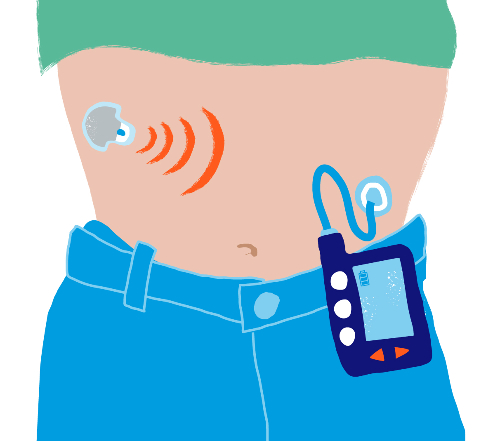
This week, NHS England announced that hybrid closed-loop systems, also known as an artificial pancreas, will be offered to adults and children on the NHS in England. Up to 1,000 people living with type 1 diabetes will benefit from a pilot of the ‘closed-loop technology’ which continually monitors blood glucose and automatically adjusts the amount of insulin given through a pump.
100 years after the discovery of insulin, the NHS has announced funding worth £2 million for a pilot roll-out of hybrid closed-loop technology. This means that 1,000 people who live with type 1 diabetes in England, who meet certain eligibility criteria, will be able to access this life-changing technology on the NHS.
Helen Kirrane is Head of Policy, Campaigns and Mobilisation. She said:
"Hybrid closed-loop technology, sometimes referred to as artificial pancreas technology, has the potential to transform the lives of people with type 1 diabetes, improving both their quality of life and clinical outcomes.
NHS England’s plan to fund a pilot rollout of this technology, for both adults and children with type 1 diabetes, is very welcome news. It will generate real-world data which will support the case for more people having access to this life-changing technology in the future.
While much more progress is needed to ensure people living with diabetes have access to the technologies they can benefit from most, this is a very significant and positive step in the right direction."
How has Diabetes UK been involved?
We've supported research to develop this technology since the beginning. We bought the UK’s first device in 1977, to help doctors stabilise blood glucose levels for people with type 1 diabetes during surgery and childbirth.
Since then, we've carried on backing research to improve this technology. We've built evidence of its life-changing impact and we’ve looked for ways to make sure it helps as many people as possible.
In 2007 we supported a world-first trial testing the technology outside of a hospital setting for the first time.
We then funded research that showed the artificial pancreas could help women with type 1 diabetes better manage their blood glucose levels during pregnancy. And, most importantly, could help more women to have safer births and healthy babies.
And we funded one of the first trials of the artificial pancreas with people with type 2 diabetes. The results, in 2018, showed that the device could transform the care some people with type 2 diabetes receive while in hospital.
We also continue to fight for wider, fairer access to diabetes technologies like insulin pumps and continuous glucose monitors – important parts of closed-loop technology.
How does the artificial pancreas work?

A hybrid closed-loop system allows your insulin pump to ‘talk’ to your continuous glucose monitor (CGM). It continuously monitors blood glucose levels and calculates the amount of insulin required. Then, it automatically adjusts your background, or basal, insulin based on your blood sugar readings. Some of the systems can also correct for high blood sugars by delivering a dose of quick-acting insulin. But you still need to tell the device when, and the amount of carbohydrate, you're eating to receive your quick-acting insulin at mealtimes.
It means that people living with diabetes can improve their HbA1c levels, spend more time with their blood glucose in target range and can make day-to-day life with diabetes a lot simpler.
Read our page on closed loop systems.
How to get involved with the pilot
This is really exciting news, and we know that lots of our members and supporters will want to find out if they can be part of the pilot. At the moment we know that people with type 1 diabetes from around 27 specialist diabetes centres in England will be involved in the pilot programme. The NHS is in the process of confirming a list of centres that will take part.
To be included in the pilot you must:
- Be using an insulin pump and the freestyle libre for more than 3 months
- Have a recent (within 3 months) HbA1c blood test that is more than 8.5% (70 mmol/mol)
The pilot will include a representative mix of adults and children living with type 1 diabetes. It will include those from ethnic minority groups and more deprived communities. This will help make sure everyone with diabetes has equal access to care that can improve their health and lives.
Each hospital involved in the pilot has a limited number of people they are allowed to include, so not everyone who meets the eligibility criteria will be able to take part in the pilot. Centres are in the process of identifying and contacting people who meet the criteria to offer them the chance to be involved.
What’s next?
We hope the pilot results will show that people living with type 1 diabetes have better control of their diabetes if they have access to closed-loop technology. The results will feed into a National Institute for Clinical Excellence (NICE) review. We hope the review will mean more people are able to access this life-changing technology. There’s a lot more progress to be made to make sure that people living with diabetes have access to the technology they need to live well with diabetes, but this is a very welcome step in the right direction.
We’re determined to build on this to make sure everyone who could benefit has access to closed-loop and other life-changing technologies, both now and in the future.
